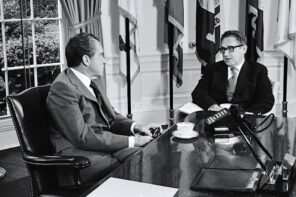If the Washington Post’s deceptively titled article, ‘Rise of a Bosnian Mayor With Headscarf Challenging Assumptions about Islam,’ is the best our major media can do, then perhaps it’s good they’re dying. The title’s half the length of a tweet and it happens to do everything but challenge assumptions about Islam.
It shouldn’t be hard to make this one of those feel-good, informative, on-the-ground, we-get-you-a-perspective-no-one-else-can-because-we’re-the Washington Post stories. Instead it reads: “A woman wearing hijab must mean Islam is taking over Europe. Because hijab, and alcohol.” Put in similarly brief terms: “Article with really long title that refers to a woman as ‘mayor with a headscarf’ unsurprisingly recycles assumptions about Islam.”
Now, you might ask, what assumptions?
Frequently, people assume that Muslim terrorists, because they sometimes defend their actions in the name of Islam, are just very religious Muslims. In this conception, there’s a continuum between the areligious who are tolerant and peaceful, and the devoutly religious, who are never far from being a murderous zombie, which is the implication of the author’s opening line linking moderation and alcohol consumption: “For years, Bosnian Muslims embraced a form of religion so moderate that many capped dinners during the holy month of Ramadan with an alcoholic drink.”
To the contrary, Gallup researchers have found that the more likely a Muslim is to practice Islam as a religion, the less likely she is to support, condone, or accept attacks against civilians and other forms of violence. (There are other correlations that may upset our conventional stereotypes: For American Muslims, the more likely you are to attend a mosque, the more likely you are to vote—and vote Democrat. So much for religion being the property of the right.)
This particular piece is by no means the most egregious offender, it’s merely the latest and appears in one of the most well-respected newspapers. The truth is, these same assumptions can be found in numerous papers, periodicals, and of course on TV. Nonetheless, for an article to note an increase in the observance of Islam and to link that to the danger of extremism is to fly in the face of the only real, rigorous evidence we have, without presenting any reasons why we should fear extremism, except common biases. Namely, headscarves are a sign of “oppression,” and the only reason Muslim women veil is because they are forced to. The evidence in many European societies, such as France, suggests otherwise.
And while certainly there are extremists who believe their vile actions are justified by Islam, this is not what the majority of Muslims believe. Further, these assumptions handicap us because they mislead us about extremism’s origins. Rather than blame political causes, which are potentially solvable, we are pushed to see this violence as emerging out of religion and therefore incapable of solution.
When you ascribe the enemy “irrationality,” you absolve yourself of the need to try to understand. Ten years on from the Iraq War, have we learned so little?
Not only does the piece peddle common fears with precious little evidence (other than headscarves here and there, and crowded mosques on weekends), it’s also offensive. To visit a place where people were slaughtered by the tens of thousands and to make no mention of this when they were attacked for no other reason than their religion, and then to make an ungrounded link to that religion and violence, is to overlook genocide. To make light of it.
To focus on a non-threat when there were other, far realer threats. It is, in fact, to legitimate the rhetoric of those who attacked Muslims in Bosnia who saw any evidence of Islamic practice as a ghostly premonition that could be preemptively stamped out. Considering what we did ten years ago on the notion of hitting before being hit, with no evidence whatsoever except a sustained public relations campaign to frighten Americans, this is a bad idea.
For people who claim that only religion makes people intolerant, consider the suffocating intolerance this article is laced with. Instead, the author references how “moderate” Bosnian Islam used to be by noting that Bosnians would drink after breaking the daily Ramadan fast. New rule: Define certain key words—‘moderate,’ ‘terrorist,’ ‘liberal.’ Notice the correlation: If Bosnians drink less, that must mean they’re on the road to terrorism and extremism.
Even where some evidence is presented, such as the presence of foreign Muslim fighters, this is taken entirely out of context. First because there was, you know, a freaking genocide. Second, Darryl Li has studied Bosnia and mujahideen (a.k.a. “jihadis”) in Bosnia for some time now; his work will be of benefit to anyone writing on the topic. An actual expert in the field, Li’s revealed how much of this claim of jihadism all across Bosnia is hyperbole and even fearmongering—stereotyping standing in for evidence.
What these kinds of articles reveal is the degree of bias that remains, so swollen with stereotype that a Bosnian woman’s choice to wear the headscarf is suggestive of “Islamic extremism” in Bosnia. In fact, the amount of “Islamic extremism” in Bosnia is quite low, especially as they just went through genocide. What the article is pointing to instead is the predictable effect of emergence from Communism.
Bosnians were allowed to practice their faith openly and proudly only after Communism; however, immediately after Communism, the war over Bosnia plunged the country into years of horrific bloodshed. Only recently, as it has cobbled itself together again, can Bosnians live in peace and begin to explore their religious heritage. This is in no way different from how Poles, Russians, and Ukrainians explored their heritage—religious and otherwise—after Communism.
But we do not see rising interest in Christianity as correlative of extremism, because we are okay with Christian religiosity. (Should Bosnians not fear that, since they were killed in the name of twisted religio-nationalist narratives? Only if they fall prey to the same crude stereotyping.) The reason we’re not okay with Muslim religiosity is because we have been led to assume that terrorism comes out of religiosity, when in fact it comes out of the manipulation of religious sentiments to advance a political agenda.
Terrorists may or may not be personally religious. Indeed, the evidence suggests they are uninterested in religiosity, except as identity, and only then, as an oppositional identity. We are coming up on the 10th anniversary of the Iraq War, a fraudulent conflict that was sold to the public by a right-wing, openly religious American president. Yet he was opposed in his decision by many people of faith (just as there were people of no faith on either side, from Christopher Hitchens’ cheerleading of war against Muslims to far-left anti-war activists who felt no affiliation with organized religion.)
But this kind of nuance is missing entirely. The war itself is missing! What we are seeing instead are fragments, united by a misleading narrative—religion is extremism, or the first step toward it. Indeed, the only mention of the Bosnian genocide describes it as: “…the bloody war that pitted Muslims here against their Serbian Orthodox and Croatian Catholic neighbors…” That’s probably the silliest description of the war I’ve ever read. How’s this for World War II: “the bloody war that pitted Jews in Europe against their German neighbors”?
That sentence is so hideous I felt disgusted just typing it, and I was typing it as a thought experiment. In fact just replace “Bosnian” with any victim of genocide, at almost any part of the article, and you’ll see what I mean. We’re given an Orientalist smorgasbord of stock imagery—“Islam was introduced by Sultan Mehmet the Conqueror” (and how was Christianity introduced to the Balkans?); “minarets pierce the skyline”; “Saudi and Turkish funds” support mosques that are crowded on the weekends—all of which causes us to miss the point.
Where is the extremism we’re supposed to be afraid of? Is it simply a woman wearing a headscarf who’s elected and appears to be a competent leader? And if that’s the case, why are we so afraid of Muslim expressions of religiosity? In any case, it’s become clear why our major media fell into line with the Iraq War as quickly as they did.




